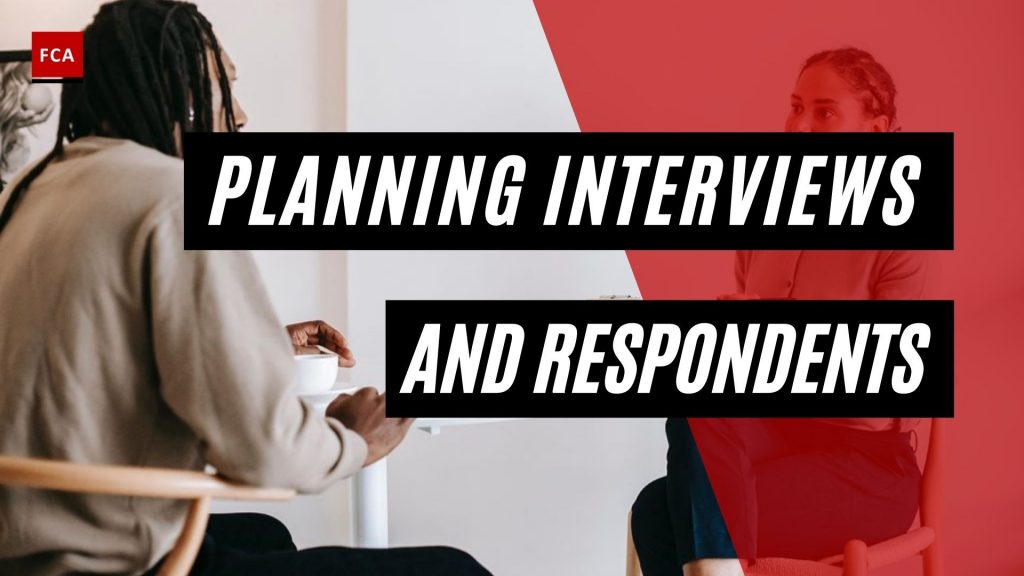Planning interviews and respondents. The witness’s mental state and the interview’s physical surroundings will likely influence the outcome of the interview. In reality, these particulars are frequently the key to unlocking the witness’s information. While investigators should never lose focus of the importance of eliciting meaningful information from witnesses, they should carefully consider how, when, and by whom an important interview will be sought and conducted.

Planning Interviews And Respondents
At an early stage of the internal investigation, the investigators should develop an interview plan that arranges the contemplated interviews in a logical sequence. As the investigation proceeds, this plan should be modified appropriately. Investigations often commence with “scoping” interviews of witnesses who have little, if any, personal knowledge of the conduct in question but who can provide an overview of relevant corporate processes, practices, and/or personnel.
Sequencing Interviews
Exigent circumstances (for example, the impending retirement or termination of a key employee witness) may dictate a different approach; however, interviews of fact witnesses typically proceed in ascending order of importance. In this way, the investigators can have a better understanding of the matter as they prepare to conduct the highest-priority interviews.
The Interview Location And Format
Unless there is something to be gained by interviewing without previous notice and/or at a certain time or location, the witness, the company, and the investigators will usually schedule the interview. Normally, investigators should try to avoid causing needless business disturbance and select a location for the interview that will encourage the witness to be candid (usually somewhere that puts the witness at ease). When it comes to sizing up a witness and his or her claims, the chance to watch and listen to the witness firsthand is critical. A telephone interview is a poor alternative, and a videoconference is only marginally better. Every effort should be taken to conduct essential interviews in person.
Preparation
The key to a successful interview is intelligent and exhaustive preparation. Best practices for interview preparation include assembling the investigative file and other information relating to the witness to be interviewed, thoroughly analyzing this information, collecting and organizing any materials for use in the interview, and preparing a detailed outline to guide the questioning of the witness.
Document Review And Organization
It is difficult to overstate the importance of document review to an internal corporate investigation. Simply put, without documents, investigators are significantly hampered in their ability to arrive at the truth—documents allow significant events to be pieced together and witnesses to be refreshed, corroborated with consistent statements, and confronted with inconsistent statements, often ones that they put forth in writing.
Assuming that investigators have the time to conduct a thorough document review, they should become very familiar with each witness’s essential papers and consider how to deliver these documents to each witness during the interview. The act of bringing a well-organized stack of documents to an interview as a show of preparation may discipline a witness who, in the absence of documentary proof to the contrary, would have assumed her or she could get away with not telling the truth.
Investigating The Witness Background
Oftentimes, it is essential to have an understanding of aspects of a witness’s background (for example, financial information, criminal or litigation history, job performance, prior employment experience, and relationships with other employees) insofar as they shed light on any “agenda” or “baggage” that the witness may have and his or her general propensity for truth-telling. Investigators should consider reviewing, at a minimum, background information maintained by the company (such as the witness’s personnel file) or available in publicly accessible databases and through internet searches.
Prepare Witness Outlines
While an experienced and exceptionally gifted interviewer might be able to wing it, the best practice is to draft a suitably comprehensive and detailed interview outline that includes all relevant documents and emails to be shown to the witness. Such an outline can help ensure that the major substantive topics are covered during the interview, and that particularly important questions are asked. The interviewer should be prepared to deviate from the outline as necessary to follow up and explore answers given during the interview.
Anticipate Witness Questions
Investigators should not be taken back if the witness raises questions during the interview. These questions are often motivated by the witness’s concern about the consequences of his or her statements. Anticipating such questions and consulting with the right company personnel in advance of the interview will enable the investigators to intelligently address the questions, if not conclusively answer them, and avoid what could otherwise have been a misstatement to the witness or disruption or postponement of the interview. Set forth below are certain questions that witnesses raise with some regularity, along with suggested responses.
Participants In The Interview And Their Roles
Who should take part in an important witness’s interview should be carefully considered. The presence or absence of certain individuals can considerably impact the tone of the interview and the amount of cooperation provided by the witness. At least two participants, a primary questioner and a principal note-taker or prover, should be properly considered as independent of the firm and, therefore, not prejudiced in favor of any certain inquiry outcome.
The prover should concentrate on accurately documenting the interview and being available to testify about it if necessary. Others should be allowed to attend only if their participation is likely to assist a valid investigative goal, such as encouraging more openness on the side of the witness. For example, the presence of an appropriate company representative without a personal stake in the investigation may reasonably be believed to have a positive effect on the witness’s comfort level and responsiveness.
If the witness insists on being accompanied at the interview by counsel or another person, the investigators should determine whether the employee is so entitled by any legal, policy, or contractual provision. Even if there is no such entitlement, allowing the witness a reasonable accommodation in this regard may be tactically sound like a show of good faith and fairness, so long as it does not threaten harm to the investigation.
Setting The Basic Ground Rules
Before asking meaningful questions, interviewers must establish the ground rules for the interview. This can be achieved by outlining the investigation’s broad scope, thanking the witness for his or her assistance, and reiterating the Upjohn cautions in a clear and non-threatening manner. The Upjohn recitation can be given not as a “warning,” but as a courtesy to aid the witness in understanding the interview’s context and the participants’ various responsibilities.
Substantively, the Upjohn warnings should clarify several points: that the investigators have been hired by the engaging entity (for example, the company or the audit committee) and do not represent the witness, that the investigators are gathering facts to provide legal advice to the entity, that the investigation is confidential and covered by the attorney-client privilege, that the privilege belongs to the entity and only the entity can waive the privilege and disclose privileged information to third parties, and that the witness must maintain the confidentiality of the investigation.
Final Thoughts
Interviews are especially useful for learning more about a participant’s experiences. The interviewer can elicit detailed information about a subject. Interviews may be useful as a follow-up to certain questionnaire respondents, for example, to further investigate their responses. During interviews, open-ended questions are frequently asked.
Before you begin designing your interview questions and process, make it clear to yourself what problem or need will be addressed using the information gathered through the interviews.









